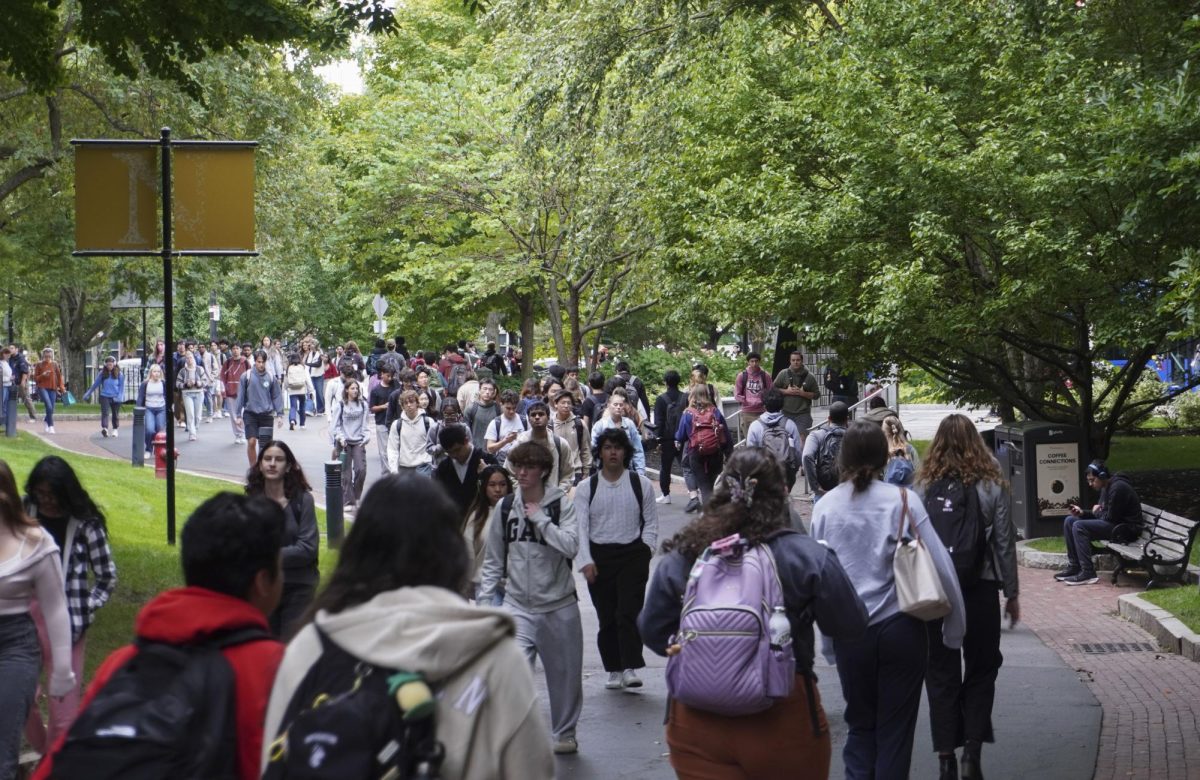The number of students enrolled in Northeastern’s Army Reserve Officers Training Corps (ROTC) program has nearly doubled in the past year, said Lieutenant Col. John McClellan, despite the persistant public disapproval of the war in Iraq. The Army challenged chapters nationwide to produce more graduates, and is a likely source of the growth, McClellan, a Northeastern professor of military science, said in a recent interview with The News. “The US government has decided to increase the size of the active duty Army … an all-volunteer force, and we project the need for more new officers in the next five to 10 years,” he said.
Last year, he said, 18 senior cadets graduated from Northeastern’s program, an elective curriculum taken with core classes to prepare its members for lives as military officers. McClellan said 19 seniors will graduate this year and the number of cadets enrolled has climbed from about 45 last year to about 75.
“We’re trying to do a number of things in this program right now to increase visibility and awareness,” he said. “A lot of it has to do with how the program is perceived, and then how hard we work at promoting the program.”
McClellan and his team introduced a series of new campaigns last year to edge the program, and its cadets, toward the forefront of student consciousness, McClellan said. During student orientation last summer, cadets visited every orientation event, he said, and about 20 cadets helped freshmen hoist their belongings into White Hall.
They also asked the admission’s office to add a new feature to the cards handed out to prospective students at college fairs, McClellan said. A box to check off if they want more information about the Liberty Battalion Army ROTC chapter was added. The change went into effect this cycle, he said.
Administrators throughout the university have also contributed to the program’s increased visibility, which is integral for the ROTC’s growth, McClellan said. “Students probably expect those of us that are in uniform, that are specifically assigned here to train officers, to promote the program,” he said.
In December, the Faculty Senate reversed a school policy from 1972 that established a maximum of four credit hours from the military science program, which could be used toward graduation. Now, cadets can use 12 of those credits. And in Fall 2006, President Joseph Aoun officially endorsed the program, McClellan said, by signing a letter posted for new students on the Liberty Battalion’s website.
According to the letter, Northeastern is one of only four universities in Boston that hosts its own Army ROTC program. Fourteen schools fall under the umbrella of Northeastern’s chapter, McClellan said, including Berklee College of Music, Boston College, Wentworth Institute of Technology and Emmanuel and Suffolk Universities. “We see [Army ROTC] as another example of experiential learning,” said Brian Kenny, vice president of marketing and communications for Northeastern. “Students in the ROTC program are gaining valuable experiences that will help them in their academics and throughout their professional careers. This is very consistent with Northeastern’s emphasis on combining classroom and real- world experience to transform students.”
McClellan said Army ROTC has some financial perks that help draw students in: since the summer of 2006, he said, the Army went from paying 80 to 100 percent of each cadet’s tuition. Northeastern, which had historically provided the additional 20 percent, didn’t retract its offer, and has since paid for half of each cadet’s room and board expenses. Cadets also receive an allowance of $300 a month, for up to 10 months a year.
“You graduate debt-free … school is tax-free … and when you graduate, you have a job,” he said.
However, students who have a change of heart about their membership in the ROTC may not have many options after joining, said Kyle Jacobs, a freshman mathematics major who is a member of the ROTC.
“I can drop out of ROTC in the first year, and after the first year you can’t drop out and if you do drop out it’s like a breach of contract, and they’re able to deploy you [to Iraq] as a private because it’s a breach of contract so you’re still technically the military’s property and they can deploy you,” he said.
Northeastern’s ROTC program was founded 56 years ago, McClellan said, and produced graduates in 1955. Since then, enrollment numbers have been mostly cyclical, fluctuating from year to year, with a few exceptions. During the Vietnam War, McClellan said, Northeastern had one of the largest ROTC programs in the country for a non-military college with upward of 2,800 cadets. Following September 11, there was a noticeable surge in applicant numbers. “We had a very good graduating class in 2005,” he said. “There was a lot of patriotic fervor – there were more people enlisted in the services, and there were more people who joined the ROTC.”
Yet, those who have may have negative viewpoints on the war in Iraq are often not allowed to express them, Jacobs said.
“I’m supposed to say yes I support the war because I’m supposed to support the president,” he said. “Coming from someone in the army I can’t say that I’m against it. You get in trouble.









